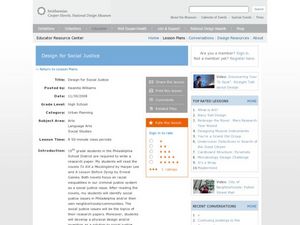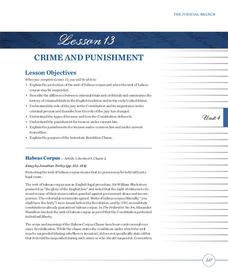Curated OER
Adult Criminal Justice System
Twelfth graders examine the procedures and protections involved in processing an accused person through the criminal justice system. They view a Powerpoint presentation, conduct research, and write a paper describing a crime they have...
Judicial Learning Center
Your Day in Court: Criminal Justice
When a person goes on trial for a crime, what options does a court have to render justice? Who are the key players in the legal system? Interested legal scholars answer the inquiries and more using an Internet-based activity, chart, and...
Curated OER
Crime and Justice
Students investigate what happens when someone is arrested. They engage in a mock trial role play about a burglary. They engage in the process of the Criminal Justice System from arrest to sentencing.
Judicial Learning Center
The Appeal Process
Why doesn't the Supreme Court hear testimony from witnesses? How do they complete an entire proceeding in less than two hours? A helpful lesson guides scholars of criminology through these and other questions by explaining how appeals...
Curated OER
Crime Time
Students examine fundamentals of American criminal justice by analyzing each step of the criminal process. They follow the process of a well-known or publicized criminal case in The New York Times, and keep a journal of its newspaper...
School Improvement in Maryland
Court Proceedings Civil Cases
What's the difference between civil and criminal law? How do the court proceedings differ in these two types of trials? How do the standards of proof differ? Why do these differences exist? As part of their examination of the...
Curated OER
Due Process Freedoms
Students participate in a simulation of the voir dire portion of a trial. There are student lawyers assigned for the prosecution and the defense. They must review and question all prospective jurors to obtain a fair and impartial jury.
Teaching Civics
Legal Ways: Extended Jurisdiction Juvenile
An amazing set of resources! Found here are several lessons that work in conjunction to help learners better understand the juvenile court system. Learners review the judicial process, discuss how juveniles are tried, and hold a class...
Curated OER
Juvenile Justice - Consequences Of Offenses To Offenders, Victims, And Community
Young scholars learn of the consequences of juvenile crime and how the state of Washington includes victims in the juvenile justice process.
Curated OER
Design for Social Justice
Students create a solution to a social justice problem within their community. In this urban planning lesson, students read To Kill a Mockingbird by Harper Lee and A Lesson Before Dying by Ernest Gaines. Students then complete a research...
Judicial Learning Center
Types of Court Cases
How can one court acquit someone of a crime, while another convicts the person of the same one? It's all because of the differences between civil and criminal trials. An informative resource provides scholars in the field of criminology...
Judicial Learning Center
Your Day in Court
Whether out of choice or necessity, people want to know what will happen on a typical day in court. A helpful lesson walks scholars in the field of criminology through the trial process from opening statements to the final verdict.
Curated OER
Trials and Tribulations
Students explore their beliefs about objectivity and the United States justice system. They examine the facets of a criminal case by researching various aspects of the judicial system and apply what they have learned to the Michael...
Curated OER
The Youth Criminal Justice Act
Students review the Youth Criminal Justice Act and examine the consequences for young people who commit crimes. They investigate the rehabilitation and reintegration processes associated with the act.
Curated OER
Government Lesson Plan: Lesson Plan 9
Students examine and compare/contrast the steps of criminal and civil cases. They define key vocabulary terms, develop an outline of a criminal and civil trial, and analyze the differences in standards of proof in legal cases.
Judicial Learning Center
Getting Ready for Trial
A courtroom can be a scary place for the uninitiated. Get familiar with the process using a helpful overview of the activities that take place prior to both civil and criminal cases. The lesson explains the differences between...
Curated OER
The Leed's footballers' trial
Students explore what happens when someone is tried for a crime. They expand their knowledge of the name "Criminal Justice System" and develop discussion skills. Students read the story Leeds footballer guilty of fighting in public. ...
BBC
Crime
Crime and punishment! Learners discuss the law, civics, and crime in the UK. They brainstorm lists of crimes and possible punishments, complete activities on a website, role-play a Juvenile Court scenario, and try to think of ways they...
Curated OER
Supreme Court Confirmation Process
Students examine the Supreme Court and the confirmation process. They simulate a confirmation hearing with students role-playing as nominees and others as members of the Judiciary Committee. Students compose short essays outlining the...
Anti-Defamation League
Exploring Solutions to Address Radical Disparity Concerns
The deaths of Michael Brown, Eric Garner, and Tamir Rice, and the protests that followed the 2014 shootings, are the focus of a current-events activity that asks class members to brainstorm and research possible strategies to address the...
Curated OER
What Makes a Good Law?
Why were laws created? Spark a group discussion on why we need laws to co-exist. Should the sale of some things be outlawed on Sundays? Read a case summary between Target and the state of Minnesota that debated this issue. Ask your...
Curated OER
Juvenile Justice-Disposition
Learners explore the dispositional hearing as a part of the juvenile justice system. After a brief discussion of the parts of the disposition hearing, students work in groups to review case studies involving juveniles in Utah's justice...
Utah State Courts
Judges in the Classroom
Class members explore the process of a disposition hearing for juveniles, particularly looking at how the judge decides what sentence the juvenile offender should receive. Task your pupils with evaluating different sample cases provided...
Heritage Foundation
Crime and Punishment
You wouldn't give someone a 10-day timeout for eating a piece of candy. The US government, too, does not believe in unreasonable punishment. A variety of exercises exploring the clauses of the US Constitution prompts class members to...

























